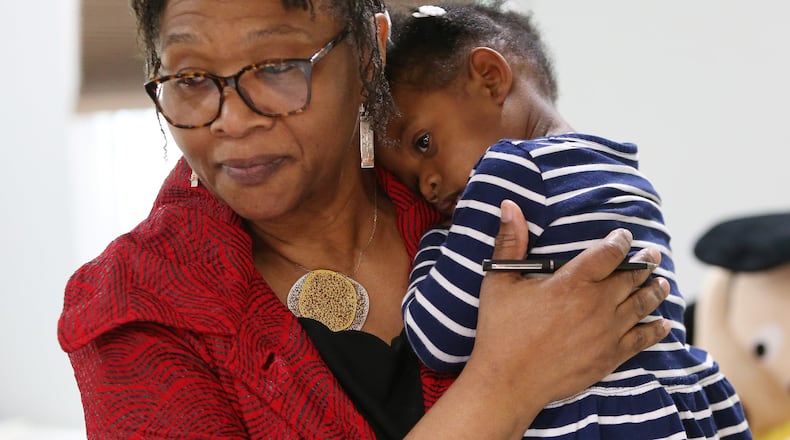Maternal mortality, rural medical care and other health problems are big priorities for Georgia leaders these days. This week, professionals testified at the state Capitol about how to ramp up state efforts to address them.
At the same time, state funding that could fuel those efforts is on the chopping block.
Facing a possible economic downturn, Gov. Brian Kemp has ordered agencies to get ahead of the curve on budget cuts. Starting Oct. 1, money amounting to about 4% of their budgets was to be withheld.
That makes for tough decisions when some state leaders’ signature issues involve health care.
"Of course I would much prefer that there not be this type of cut," said state Rep. Sharon Cooper, R-Marietta, the chairwoman of the House Health and Human Services Committee and also a co-chairwoman of a study committee on maternal mortality, a problem that has hit Georgia harder than any other state and many industrialized nations.
But everyone has their favored areas, Cooper said.
A spokesman for Kemp said that although the start date for cuts was Oct. 1, they are still a work in progress. Agencies have followed Kemp’s order and drawn up proposals. “Once we have a final budget we’ll propose that to the General Assembly,” said the spokesman, Cody Hall. “All of that is very open to the public.”
Within those preliminary proposals, The Atlanta Journal-Constitution identified well over $50 million in cuts to health programs during the fiscal year that is already underway. They include agencies that provide health care for prisoners, handle poor people’s applications for health insurance, and treat the mentally ill.
In the following fiscal year, from July 2020 to June 2021, the left-leaning Georgia Budget and Policy Institute has identified $56 million in cuts to one department alone, the Department of Behavioral Health and Developmental Disabilities.
“We’ve put in over $200 million in the last seven or eight years and that’s really helped,” as the state worked to get itself released from federal supervision of its mental health care failings, said Laura Harker, an analyst with the institute. The new money has gone to help people move from mental hospitals into community living that still had mental health supports, as well as other tasks. “That’s been really good progress,” she said.
The $1.4 billion budget of the Department of Behavioral Health and Developmental Disabilities is being cut by tens of millions of dollars this year. Proposed reductions include $4.9 million to services for adult addictive diseases, $9.6 million for adult mental health services, and $11.8 million for child and adolescent mental health services.
Medicaid, the health care program for the poor, disabled and elderly living in nursing homes, is exempt from cuts.
But the caseworkers who assist in signing up people for Medicaid — a group that is already low-paid and short-staffed — are housed in the Department of Human Services, which has proposed hiring limits and administrative cuts.
And Medicaid’s workload might increase under one of the solutions the House Study Committee on Maternal Mortality considered with enthusiasm Thursday. The committee, which is asking why so many Georgia women die from pregnancy, heard that expanding Medicaid coverage for new moms to one year following birth could make a big difference.
Another issue for pregnant women, the panel heard, was access to rural health care — something that Kemp has also promoted. A solution the committee discussed included increasing the services available to rural residents at public health clinics, which are located in every county and funded in part by the state Department of Public Health. The DPH is also facing big cuts.
Cooper said she has been in contact with the governor’s office, and that she believes cuts implemented at the moment are mainly through hiring freezes in certain areas and attrition.
“They’re trying to take a very strategic look at it rather than just going with a sledgehammer,” Cooper said.
One of the most notable proposed cuts deals directly with maternal mortality. A $500,000 grant to the Morehouse School of Medicine to help identify red flags for danger to new mothers’ health was suggested for elimination.
“It takes a lot of money to tackle a problem we’ve been dealing with for many years,” said Natalie Hernandez, an assistant professor at Morehouse. “The research and the training and the engagement of our community members needs to happen, and that can’t happen without resources behind it.”
Publicity surrounding the proposed cut has sparked internal discussions, and Hernandez and others said they have hope that the grant will be spared.
At a recent board meeting, DPH officials explained some of the work done by staffers. They detailed the drama of recently beating back an outbreak of hepatitis A from neighboring states: Software alerted the DPH to positive test results, and epidemiologists found those patients and interviewed them. They then identified likely hot spots and had vaccination workers spread out to inoculate the populations they'd identified. The Atlanta-based U.S. Centers for Disease Control and Prevention hailed their work.
The AJC asked DPH Commissioner Kathleen Toomey whether there might be cutbacks to such resources, but she said she was “not at liberty” to discuss the cuts.
About the Author
Keep Reading
The Latest
Featured




